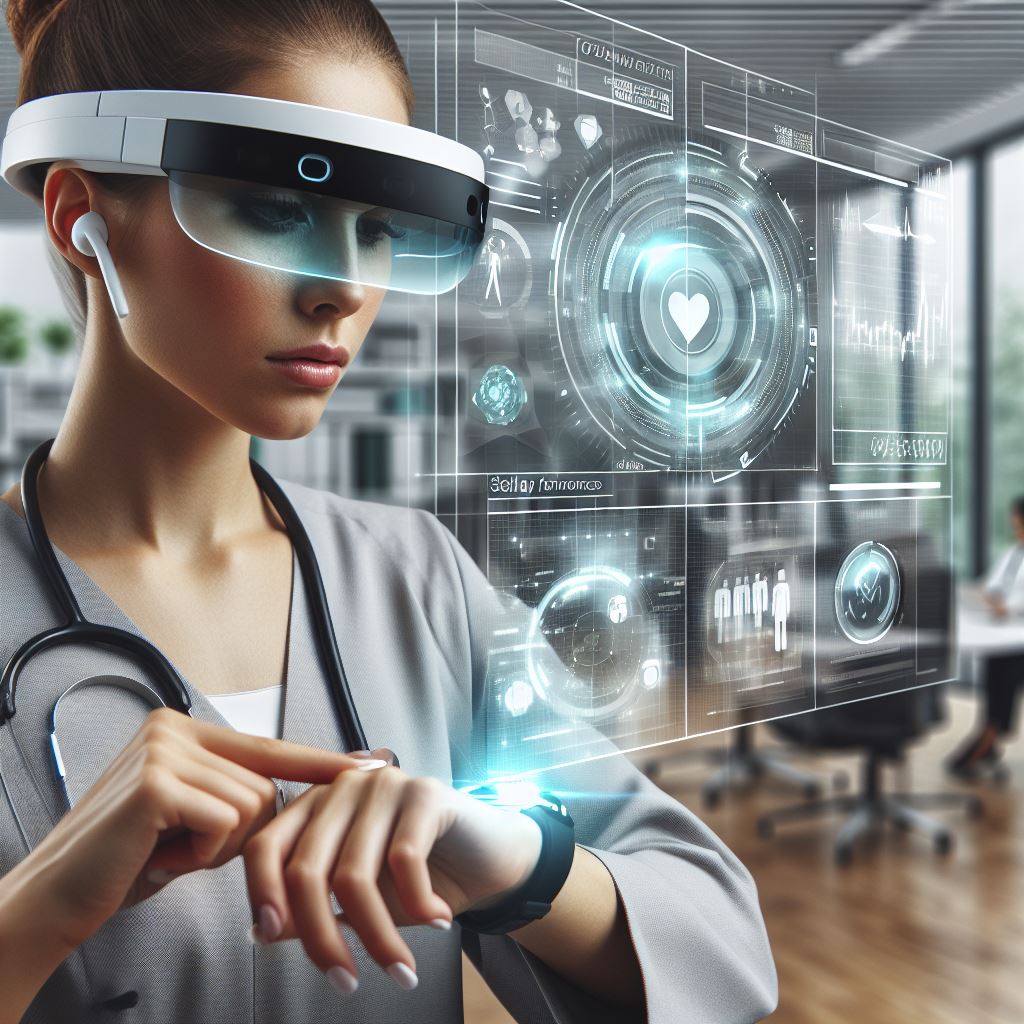Introduction
In healthcare administration, the efficient management and coordination of healthcare services play a crucial role.
As advancements in technology continue to evolve, incorporating emerging tech becomes increasingly important.
Therefore, this blog post aims to explore the impact of emerging technologies on healthcare administration.
Emerging technologies refer to the latest innovations and advancements in healthcare that have transformative potential.
These technologies include artificial intelligence, blockchain, telemedicine, machine learning, and electronic health records.
By incorporating these technologies into healthcare administration, numerous benefits can be achieved.
This includes improved efficiency, enhanced patient experience, cost savings, and better decision-making.
By streamlining administrative tasks, emerging tech reduces the burden on healthcare professionals and staff.
Furthermore, it enables seamless communication and coordination among various healthcare stakeholders.
As a result, healthcare administrators can allocate resources more effectively and make informed, data-driven decisions.
In fact, the implementation of emerging technologies in healthcare administration has a significant impact.
These advancements not only improve efficiency but also enhance patient care, decision-making, and resource allocation.
Therefore, it is crucial for healthcare organizations to embrace and integrate emerging technologies into their administrative processes.
Overview of Emerging Technologies in Healthcare Administration
Definition of emerging technologies
Emerging technologies refer to innovative advancements that are in the early stages of development and utilization within a particular field, in this case, healthcare administration.
Examples of emerging technologies being adopted
- Artificial intelligence (AI): AI is being increasingly utilized in healthcare administration to automate tasks, analyze vast amounts of data, and improve patient care.
- Blockchain: Blockchain technology offers secure and transparent record-keeping, enabling efficient management of patient data, drug supply chains, and billing processes.
- Internet of Things (IoT): IoT devices are being used in healthcare administration to monitor patients remotely, track medical equipment, and improve overall operational efficiency.
- Big data analytics: By leveraging big data analytics, healthcare administrators can gain valuable insights into patient trends, manage costs, and optimize resource allocation.
Benefits of adopting emerging technologies in healthcare administration
Embracing emerging technologies in healthcare administration yields numerous advantages, such as:
- Enhanced Efficiency: Automation and streamlined processes save time, allowing healthcare administrators to focus on critical tasks and improve overall efficiency.
- Improved Patient Care: Emerging technologies enable personalized and data-driven approaches, leading to better diagnosis, treatment, and patient outcomes.
- Cost Savings: Advanced technologies optimize resource allocation, reduce administrative and operational costs, and prevent costly errors.
- Enhanced Data Security: By incorporating blockchain and secure systems, healthcare administrators can ensure the privacy and integrity of patient data.
- Proactive Decision-Making: By utilizing AI and big data analytics, healthcare administrators can make informed decisions based on real-time data and predictive insights.
- Streamlined Communication and Collaboration: Emerging technologies facilitate seamless communication among healthcare providers, administrators, and patients, leading to improved coordination and collaboration.
In short, the adoption of emerging technologies has the potential to revolutionize healthcare administration.
Through the utilization of AI, blockchain, IoT, and big data analytics, healthcare administrators can benefit from increased efficiency, improved patient care, cost savings, enhanced data security, proactive decision-making, and streamlined communication.
As technology continues to advance, it is essential for healthcare administrators to embrace and leverage these emerging tools for a more sustainable and effective healthcare system.
Application of Artificial Intelligence in Healthcare Administration
Use of AI for data analysis and decision-making
Artificial Intelligence (AI) has revolutionized healthcare administration by offering advanced data analysis and decision-making capabilities.
AI algorithms can analyze vast amounts of medical data, enabling healthcare providers to make more accurate diagnoses and treatment plans.
Automation of administrative processes using AI
In addition to data analysis, AI can automate various administrative processes in healthcare administration.
Tasks such as appointment scheduling, billing, and patient record management can be efficiently handled by AI systems, reducing administrative burden and improving overall efficiency.
AI-powered virtual assistants for patient management and scheduling
The use of AI-powered virtual assistants has facilitated patient management and scheduling in healthcare administration.
Virtual assistants can interact with patients, answer their questions, provide personalized medical advice, and schedule appointments, enhancing patient experience and streamlining administrative tasks.
Impact of AI on healthcare cost optimization and resource allocation
AI has a significant impact on healthcare cost optimization and resource allocation.
Unlock Your Career Potential
Visualize a clear path to success with our tailored Career Consulting service. Personalized insights in just 1-3 days.
Get StartedBy analyzing patient data and historical trends, AI algorithms can identify cost-saving opportunities and improve resource allocation, ensuring efficient utilization of healthcare resources and reducing unnecessary expenses.
Furthermore, AI can aid in predicting disease outbreaks and epidemics, enabling healthcare administrators to allocate resources effectively and proactively plan for potential healthcare crises.
In general, the application of artificial intelligence in healthcare administration offers numerous benefits and transformative potential.
From data analysis and decision-making to administrative process automation, AI has revolutionized the way healthcare organizations operate.
AI-powered virtual assistants have improved patient management and scheduling, providing personalized care and streamlining administrative tasks.
Additionally, AI has a significant impact on healthcare cost optimization and resource allocation, ensuring efficient utilization of resources and reducing unnecessary expenses.
As the field of AI continues to advance, its role in healthcare administration will only grow, leading to improved patient care, reduced costs, and enhanced efficiency in the delivery of healthcare services.
Integration of Blockchain in Healthcare Administration
Role of blockchain in securely managing patient data
- Blockchain technology provides a secure and tamper-proof way to manage and store patient data.
- By incorporating blockchain, healthcare administrators can ensure the privacy and integrity of sensitive patient information.
- The decentralized nature of blockchain prevents unauthorized access and reduces the risk of data breaches.
- Smart contracts on the blockchain can automate consent management and ensure data sharing is only done with proper authorization.
Streamlining healthcare supply chain management with blockchain
- Blockchain technology can revolutionize supply chain management in the healthcare industry.
- With blockchain, healthcare administrators can track and verify the authenticity of pharmaceutical products.
- By recording the entire supply chain on the blockchain, administrators can ensure the quality and safety of medications.
- Blockchain can also enhance transparency and accountability by providing real-time visibility into the movement of medical supplies.
Benefits of blockchain for interoperability and data exchange
- Interoperability is a major challenge in healthcare administration, and blockchain can help address this issue.
- Blockchain technology enables the secure and seamless exchange of healthcare data between different systems and providers.
- With blockchain, administrators can create a single source of truth for patient records, reducing errors and duplication.
- Blockchain’s decentralized nature eliminates the need for intermediaries, making data exchange faster and more efficient.
Implementing blockchain in healthcare administration has numerous advantages:
- Enhanced security and privacy of patient data
- Improved supply chain management and drug authentication
- Streamlined interoperability and data exchange between healthcare systems
- Reduced administrative costs and increased efficiency
- Greater transparency and accountability in healthcare administration
However, there are some challenges that need to be addressed in the integration of blockchain in healthcare:
- Regulatory and legal concerns surrounding the use of blockchain in healthcare
- Integration with existing systems and infrastructure
- Ensuring data accuracy and integrity on the blockchain
- Educating healthcare professionals and administrators about blockchain technology
- Addressing scalability issues and managing large amounts of data on the blockchain
In the end, the integration of blockchain in healthcare administration has the potential to revolutionize the industry.
By securely managing patient data, streamlining supply chain management, and promoting interoperability, blockchain can improve the overall efficiency and quality of healthcare services.
While challenges exist, the benefits of blockchain technology make it a promising solution for the future of healthcare administration.
Utilizing the Internet of Things in Healthcare Administration
IoT-enabled devices for remote patient monitoring:
- IoT devices can track vital signs and send real-time data to healthcare providers.
- Remote monitoring allows for early detection of health issues and timely interventions.
- Patient-generated data can provide a more accurate picture of a patient’s health status.
- Real-time monitoring enables healthcare professionals to make informed decisions and provide personalized care.
Improving inventory management and medical equipment maintenance
- IoT can provide real-time tracking of medical supplies and equipment.
- Automated inventory management helps prevent stockouts and avoid wastage or expiration of supplies.
- IoT sensors can monitor the condition of medical equipment and predict maintenance needs.
- Proactive maintenance reduces downtime and enhances patient safety by ensuring equipment functionality.
Enhancing communication and collaboration among healthcare professionals
- IoT facilitates seamless communication and information sharing among healthcare teams.
- Real-time access to patient data improves care coordination and reduces errors and delays.
- Collaborative platforms enable healthcare professionals to share expertise and discuss complex cases.
- Streamlined communication leads to faster decision-making and improved patient outcomes.
Overall, the utilization of the Internet of Things (IoT) in healthcare administration offers significant benefits.
The use of IoT-enabled devices for remote patient monitoring allows for proactive and personalized care, ensuring early detection of health issues and timely interventions.
With real-time monitoring and patient-generated data, healthcare professionals can make informed decisions and provide tailored treatment plans.
Additionally, IoT improves inventory management by providing real-time tracking of medical supplies and equipment, preventing stockouts, and reducing wastage.
IoT sensors also enable predictive maintenance of medical equipment, enhancing patient safety through proactive measures.
Moreover, IoT enhances communication and collaboration among healthcare professionals.
Seamless communication and information sharing enable healthcare teams to coordinate care effectively and reduce errors and delays.
Collaborative platforms further facilitate discussions on complex cases and enable healthcare professionals to leverage each other’s expertise.
Ultimately, streamlined communication and collaboration lead to faster decision-making and improved patient outcomes.
Generally, the integration of IoT in healthcare administration revolutionizes the way healthcare is delivered.
It empowers healthcare professionals with real-time data, enabling proactive care and personalized treatment plans.
IoT also optimizes inventory management and medical equipment maintenance, reducing costs and improving patient safety.
Additionally, IoT facilitates seamless communication and collaboration among healthcare teams, enhancing care coordination and decision-making.
As technology continues to advance, the role of IoT in healthcare administration is expected to expand, further revolutionizing the healthcare industry.
Read: Continuing Education for Nurses in Canada

Harnessing Big Data Analytics in Healthcare Administration
Leveraging big data for predictive analytics and personalized medicine
The healthcare industry is experiencing a revolution with the integration of big data analytics.
By harnessing the power of large and complex datasets, healthcare administrators can gain valuable insights and make informed decisions.
Big data analytics allows healthcare professionals to predict patient outcomes and customize treatment plans based on individual characteristics.
With access to vast amounts of data, physicians can identify patterns and correlations to personalize medical interventions.
Enhancing patient outcomes through data-driven decision-making
Gone are the days of relying solely on experience and intuition to make important healthcare decisions.
Big data analytics enables healthcare administrators to make data-driven decisions, improving patient outcomes and organizational efficiency.
Through real-time data analysis, administrators can identify trends, monitor patient progress, and develop evidence-based strategies.
By eliminating guesswork and embracing data-driven decision-making, healthcare practices can provide higher quality care and optimize resource allocation.
Addressing public health challenges using big data analysis
In addition to improving individual patient care, big data analytics also plays a crucial role in addressing public health challenges.
By analyzing large datasets from various sources, healthcare administrators can identify patterns and trends that help prevent and manage outbreaks.
For instance, during the COVID-19 pandemic, big data analytics enabled healthcare administrators to track the spread of the virus, predict hotspots, and allocate resources accordingly.
This proactive approach not only saves lives but also minimizes the strain on healthcare systems.
The Future of Big Data Analytics in Healthcare Administration
The potential of big data analytics in healthcare administration is immense and continues to evolve.
As technology advances and more data becomes available, administrators can expect even greater opportunities for improvement.
Some key areas of future development include:
- Precision medicine: Utilizing big data analytics to identify genetic markers and develop tailored treatment plans.
- Population health management: Using data analytics to identify population health risks and implement targeted interventions.
- IoT integration: Incorporating data from Internet of Things (IoT) devices to enhance real-time monitoring and preventive care.
- Predictive modeling: Developing advanced algorithms to predict disease outbreaks and optimize resource allocation.
Lastly, big data analytics is revolutionizing healthcare administration by providing valuable insights for predictive analytics, personalized medicine, and decision-making.
By leveraging the power of big data, healthcare professionals can enhance patient care, address public health challenges, and shape the future of healthcare delivery.
Read: Nursing Career Paths in Canada Explored
Challenges and Concerns in Adopting Emerging Technologies in Healthcare Administration
Privacy and Security Risks
- Increased use of technology in healthcare administration exposes sensitive patient information to potential breaches.
- The collection and storage of large amounts of data increase the risk of unauthorized access.
- Healthcare organizations must invest in robust security measures to protect patient privacy and prevent data breaches.
- Compliance with privacy regulations, such as HIPAA, becomes more complex due to the integration of emerging technologies.
Training and Education for Healthcare Professionals
- The adoption of emerging technologies in healthcare administration requires training and education for healthcare professionals.
- Healthcare professionals need to learn how to effectively use new technologies and integrate them into their daily workflow.
- Continuous training programs should be established to keep healthcare professionals updated with the latest technological advancements.
- Lack of proper training and education can hinder the successful adoption and utilization of emerging technologies.
Integration Difficulties with Existing Systems
- Implementing emerging technologies in healthcare administration often requires integration with existing systems.
- Compatibility issues may arise when trying to connect new technologies with legacy systems.
- Healthcare organizations may need to invest in additional resources and IT infrastructure to ensure seamless integration.
- Proper planning and collaboration between IT departments and vendors are essential to overcome integration challenges.
Ethical Implications and the Human Touch in Healthcare
- The increased reliance on technology can lead to potential ethical implications in healthcare administration.
- Balancing the use of technology with the need for personalized patient care poses a challenge.
- The human touch, such as empathy and bedside manner, must not be overshadowed by technology.
- Healthcare organizations should prioritize maintaining a balance between the benefits of technology and preserving the essential human aspects of healthcare.
In essence, the adoption of emerging technologies in healthcare administration brings numerous challenges and concerns.
Privacy and security risks, training and education for healthcare professionals, integration difficulties with existing systems, and ethical implications are key areas that healthcare organizations must address.
By actively addressing these challenges, healthcare administration can harness the power of emerging technologies while ensuring the highest quality of care for patients.
Read: The Role of Nurses in Canadian Healthcare
Delve into the Subject: Canadian Pharmacists’ Role in Healthcare
You Might Also Like: Impact of COVID-19 on Pharmacy Work
Discover More: Patient Care: Stories from Canadian Doctors
Future Trends and Possibilities
In recent years, emerging technologies such as artificial intelligence (AI), blockchain, Internet of Things (IoT), and big data analytics have revolutionized various industries, including healthcare administration.
These advancements have the potential to significantly impact the way healthcare processes are managed and optimized.
Continued advancements in AI, blockchain, IoT, and big data analytics
- Artificial Intelligence (AI): AI is expected to continue evolving and improving its capabilities in healthcare administration. Machine learning algorithms can analyze large volumes of patient data, enhancing decision-making processes and optimizing resource allocation.
- Blockchain Technology: Blockchain offers secure and transparent data sharing, ensuring interoperability among different healthcare systems. It can streamline administrative processes, such as managing medical records, billing, and insurance claims.
- Internet of Things (IoT): IoT devices enable real-time monitoring of patient health, allowing administrators to proactively manage patient care. IoT can also improve inventory management and asset tracking in healthcare facilities.
- Big Data Analytics: With the increasing amount of healthcare data, big data analytics plays a crucial role in extracting valuable insights. It helps administrators identify patterns, predict disease outbreaks, and optimize healthcare resource utilization.
Potential impact on healthcare administration processes
- Efficient Resource Allocation: By leveraging AI and big data analytics, healthcare administrators can optimize resource allocation based on real-time patient needs and demand. This can lead to reduced wait times and better utilization of facilities, equipment, and staff.
- Enhanced Decision Making: AI-powered systems can swiftly process vast amounts of data to support administrators in making informed decisions. This can improve patient outcomes, increase operational efficiency, and reduce medical errors.
- Improved Patient Experience: IoT devices and AI-powered chatbots can improve communication and accessibility for patients, reducing administrative burdens and enhancing patient satisfaction.
- Cost Savings: Streamlining administrative processes using blockchain and automation can reduce costs associated with paperwork, manual data entry, and billing errors. This enables healthcare organizations to allocate resources more effectively.
Importance of staying updated and adaptable in the field
Keeping up with emerging technologies and adapting to new trends is crucial for healthcare administrators to stay relevant and efficient in their roles.
- Lifelong Learning: Continuous education and professional development are essential for healthcare administrators to understand the potential applications of emerging technologies and how to implement them effectively.
- Collaboration with IT Professionals: Healthcare administrators should actively collaborate with IT professionals to leverage their expertise in implementing and integrating new technologies into existing systems.
- Regulatory Compliance: Staying updated with evolving regulations and privacy laws related to emerging technologies ensures that healthcare administrators adhere to ethical and legal standards.
- Cultivating a Culture of Innovation: Organizations should foster an environment that encourages experimentation and innovation, allowing healthcare administrators to explore new ways of utilizing emerging technologies.
Essentially, the rapid advancements in AI, blockchain, IoT, and big data analytics offer tremendous opportunities for improving healthcare administration processes.
Adapting to these future trends and staying updated with emerging technologies will be key to driving operational efficiency, enhancing patient experience, and achieving better overall outcomes in the field of healthcare administration.
Read: Challenges Faced by Nurses in Canada
Conclusion
This blog post has highlighted the importance of emerging technologies in healthcare administration.
The key points discussed include the use of artificial intelligence, blockchain, and telemedicine to streamline processes, improve efficiency, and enhance patient care.
These technologies have the potential to revolutionize the healthcare industry by reducing costs, preventing errors, and increasing access to healthcare services.
Healthcare administrators must embrace and explore these technologies to drive progress in the field.
By harnessing the power of emerging tech, healthcare organizations can improve patient outcomes, optimize resource allocation, and transform the way healthcare services are delivered.
The potential of these technologies is limitless, and it is up to healthcare administrators to harness their full potential.
Embracing these technologies requires a mindset shift and a willingness to adapt to change.
It is important to invest in training and education to ensure that healthcare administrators are equipped with the necessary skills to make the most of these emerging technologies.
By embracing and exploring these technologies, healthcare administrators can not only stay ahead of the competition but also transform the healthcare landscape for the better.
The future of healthcare administration lies in the hands of those who are willing to embrace and harness the power of emerging technologies.




